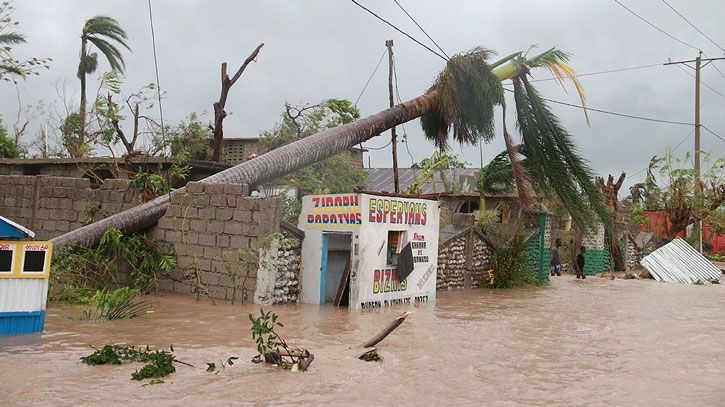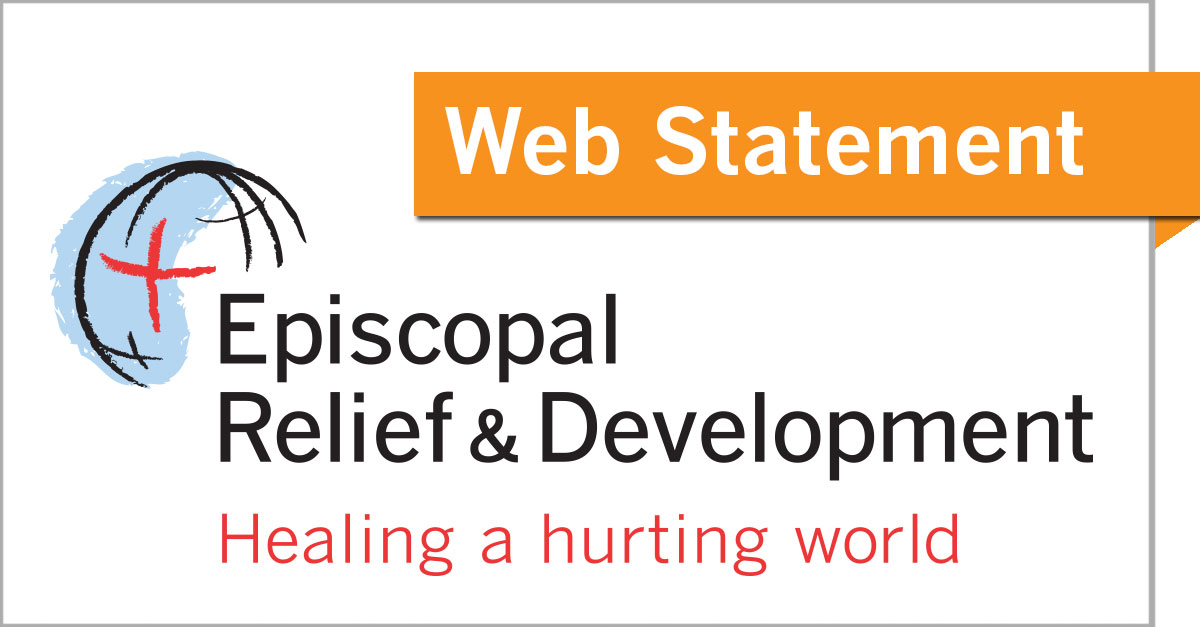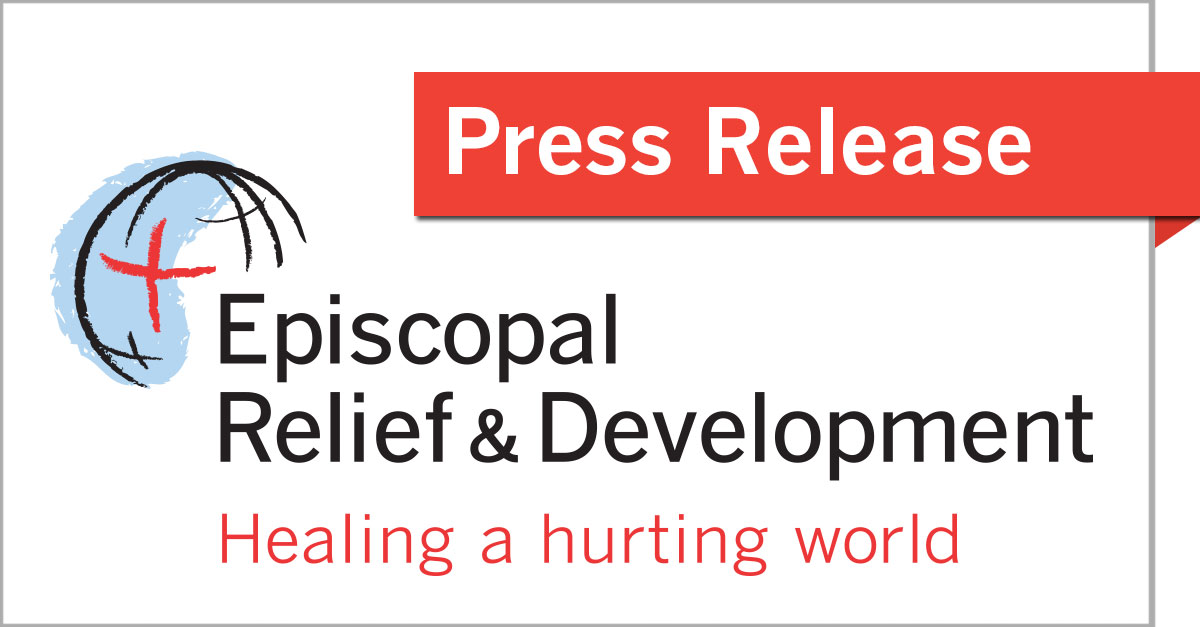Episcopal Relief & Development Responds to Hurricane Matthew

Episcopal Relief & Development is supporting disaster response efforts in Haiti and several Episcopal dioceses in the United States following Hurricane Matthew, which blasted through the Caribbean as a Category 4 storm before moving up the Atlantic coast and causing damage from Florida through southern Virginia.
- 10/20: Episcopal Relief & Development Responds to Hurricane Matthew in Haiti and Southeast US
- 10/14: Response Programs Developing in Hurricane-Impacted Southeast US
- 10/10: Ongoing Assessments in Haiti, Cuba and Carolinas Following Hurricane Matthew
- 10/7: Humanitarian Needs in Haiti; Florida Braces for Storm Impact
- 10/4: Hurricane Impacts Haiti, Makes Way Toward Florida
- 10/3: Prayers for Communities Bracing for Hurricane Matthew
Download bulletin inserts here:
- full page English (PDF) (JPG)
- half page English (PDF) (JPG)
- full page Español (PDF) (JPG)
- half page Español (PDF) (JPG)
You can also cut and paste this text into a bulletin or print newsletter:
Episcopal Relief & Development urges prayers for communities in the Caribbean and along the US East Coast that are dealing with the impact of Hurricane Matthew. Please donate to the Hurricane Matthew Response Fund and visit the organization’s website for more information about relief and recovery efforts. https://www.episcopalrelief.org/hurricane-matthew-response
Episcopal Relief & Development is supporting disaster response efforts in Haiti and several Episcopal dioceses in the United States following Hurricane Matthew, which blasted through the Caribbean as a Category 4 storm before moving up the Atlantic coast and causing damage from Florida through southern Virginia.
Episcopal Relief & Development is providing direct support for food, water and shelter for approximately 520 families staying on church properties in Haiti’s southern peninsula, and is working with US dioceses to assess and respond to local needs after the storm. Churches in affected areas are leveraging their existing ministries and community relationships to provide specialized services and care for people who are displaced from their homes.
“Dioceses are engaging in creative and insightful disaster response outreach activities to populations that might not otherwise be able to easily access assistance,” said Katie Mears, Director of the organization’s US Disaster Program. “Florida is a great example of this, in their support of an existing, thriving worship community whose membership is primarily people experiencing homelessness, and East Carolina’s bolstering of a long-running ministry that assists migrant farmworkers is exactly the kind of thing that shows excellent stewardship of resources.”
In Florida, diocesan leaders are responding to emergency needs and continuing community assessments. Currently, Episcopal Relief & Development support will expand the ministry of Church Without Walls in Jacksonville to provide food, water, clothing, bedding and sheltering materials for up to 300 homeless individuals in the area. Church Without Walls reaches people through weekly outdoor prayer and worship services that welcome all to share their unique gifts in community.
As flooding remains and evacuations continue in North Carolina, the Diocese of East Carolina is responding by reaching out and providing gift cards in hard-hit areas. In particular, support from Episcopal Relief & Development is helping to increase the response of the Episcopal Farmworker Ministry affiliated with La Iglesia Episcopal de la Sagrada Familia, a Spanish-language congregation in the town of Dunn. This ministry’s nearly 30 distinct outreach programs offer assistance with food, clothing, housing, immigration and advocacy, and the additional funds will help provide storage space and replacement of household goods. This support will also enable two other Spanish-language congregations with connections to well-established English-speaking congregations to use their buildings and connections to aid migrant workers.
“I’m extremely proud of how the dioceses throughout the impacted region are caring for their neighbors and meeting needs in this initial phase of the emergency response,” Mears said. “They have done impressive work reaching out during these first ten days, and are developing relationships that will continue to be useful through the entire disaster recovery process.”
In Haiti, Episcopal Relief & Development is providing direct assistance for food, water and shelter to church partners and displaced families sheltering in Petit Trou de Nippes, Paillant-Jeanette, Miragoane, Torbeck, Beraud, Jeremie and Bainet. The organization’s staff has received information on specific vulnerable families through the network of Episcopal priests and is on the ground providing support in each community. Approximately 520 families are currently receiving assistance through these efforts.
“The Haiti response is developing rapidly as transport and communications are restored to impacted areas,” said Abagail Nelson, Episcopal Relief & Development’s Senior Vice President of Programs. “The hurricane caused extensive flooding and mudslides, power outages and water shortages – compounding concerns about the possible spread of cholera. The Church is reaching out to the vulnerable in its midst.”
Please continue to pray for communities affected by Hurricane Matthew, and donate to the Hurricane Matthew Response Fund to help Episcopal Relief & Development assist local partners in responding to critical needs.
Congregations are invited to download and use these bulletin inserts to raise awareness and support for this vital response effort.
For over 75 years, Episcopal Relief & Development has served as a compassionate response to human suffering in the world. The agency works with more than 3 million people in nearly 40 countries worldwide to overcome poverty, hunger and disease through multi-sector programs, using the Sustainable Development Goals (SDGs) as a framework. An independent 501(c)(3) organization, it works closely with Anglican Communion and ecumenical partners to help communities create long-term development strategies and rebuild after disasters.
Episcopal Relief & Development is working with diocesan leaders across the Southeast, from Florida to Virginia, as they develop emergency response plans based on damage reports and needs assessments following Hurricane Matthew. Initial relief efforts will include assisting individuals and families with food, temporary housing, household items and storage space while dioceses are developing longer-term recovery plans. These activities aim to reach the most vulnerable members of the community, providing aid in ways that support the local economy and fit area needs and context.
“Local churches continue to assess needs even as preliminary support has arrived in some communities,” said Abagail Nelson, Episcopal Relief & Development’s Senior Vice President for Programs. “It is still quite early in the disaster cycle for many affected areas, and food, water, and shelter continues to remain the priority.”
In the United States, record-breaking flooding occurred in North Carolina following several days of heavy rain. Although the rain has stopped, rivers are still rising in some locations and the water may take many days to recede. In Florida, the most severe damage was a result of storm surges along the coast and extreme winds that downed trees and power lines miles inland. As far north as Virginia Beach, in southern Virginia, large amounts of rainfall on already saturated ground caused flooding and varying degrees of damage. Once flood waters recede, communities can begin mucking out flooded homes and businesses, repairing drywall and replacing carpet and appliances. Until then, many churches in and near the impacted areas are providing aid and pastoral care to people who have been displaced or whose homes have been damaged.
In the Caribbean, assessments continue as roads and communications infrastructure are repaired. In Haiti, the spread of cholera through contaminated water in the hard-hit southern region prompted the World Health Organization to send 1 million vaccine doses for delivery through local health officials. The official death toll in Haiti after the storm stands at 473, though other sources say it exceeds 1,000, and a disease outbreak like the cholera epidemic that followed the 2010 earthquake could cause a second wave of deaths. Episcopal Relief & Development is supporting church partners and displaced families sheltering in Petit Trou de Nippes, Miragoane, Torbeck and Le Pretre, Les Cayes, Jeremie and Leogane, and providing emergency relief for food, water, and shelter support needs.
Please continue to pray for communities affected by Hurricane Matthew, for first responders who are rescuing and caring for people in need and for the families and friends of those who lost their lives.
Donations to the Hurricane Matthew Response Fund will help Episcopal Relief & Development support Episcopal networks in providing critical assistance to communities in need.
Please download and use these bulletin inserts to raise awareness and support for this vital response effort.
Episcopal Relief & Development continues to provide technical assistance to local partners in the areas affected by Hurricane Matthew, as the storm dissipates over the Atlantic Ocean. In the places most severely impacted, information gathering is hampered by downed communications lines, widespread power outages and damage to critical roads and bridges. For example, the main bridge that connects the Haitian capital of Port-au-Prince to the nation’s southern peninsula was destroyed, causing significant delays in relief supplies and disaster responders accessing devastated parts of the country.
“Due to the power outages and communications challenges in the aftermath of Hurricane Matthew, information about the scale of the storm’s impact is coming in slowly,” said Abagail Nelson, Episcopal Relief & Development’s Senior Vice President for Programs. “From what we are seeing so far, the damage is extensive in a number of areas and it will take a long time, even years, for many of these places to recover.”
Nearing one week after the storm, Episcopal Church-affiliated organizations and networks in Haiti and Cuba continue to assess damage and respond to emergency needs. In Haiti, Episcopal Relief & Development support will enable local partners such as the Bishop Tharp Institute (BTI) to provide food and water to displaced people sheltering on the school’s campus. BTI is located in Les Cayes, one of the most hard-hit areas of Haiti’s southern peninsula. As of October 9, more than 1.4 million people are in need of humanitarian assistance and over 61,000 people are in temporary shelters, according to UN OCHA. The Haitian Directorate for Civil Protection has confirmed 336 fatalities as of October 8, though other sources place the death toll upwards of 1,000.
In the United States, the slow-moving storm grazed the Florida coast and had a large impact further north into the Carolinas. Episcopal Relief & Development is in contact with dioceses along the southern Atlantic coast, providing technical assistance to local leaders who are reaching out in their communities. After several days of heavy rain, flood levels continue to rise in areas of South Carolina and eastern North Carolina, stranding large numbers of people and prompting evacuations. Church partners are monitoring the situation locally and communicating as able regarding property damage and community members with emergency needs.
Please continue to pray for communities affected by Hurricane Matthew, for first responders who are rescuing and caring for people in need and for the families and friends of those who lost their lives.
Donations to the Hurricane Matthew Response Fund will help Episcopal Relief & Development support Episcopal networks in providing critical assistance to communities in need.
Please download and use these bulletin inserts to raise awareness and support for this vital response effort.
Statement from Presiding Bishop Michael Curry Read more >>
Blog: Episcopal Relief & Development’s Program Officer in Haiti, Ernest Cajuste, shares his account of Hurricane Matthew and expresses hope as the country responds and prepares for recovery Read more >>
Hurricane Matthew struck Haiti and several other Caribbean nations as a Category 4 storm on October 4, affecting millions of people and prompting large-scale evacuations. The hurricane weakened slightly to a Category 3 storm after it moved slowly through the Bahamas and began tracking north along Florida’s Atlantic coast. Matthew is forecast to impact Georgia and the Carolinas over the following days, threatening heavy rains, severe winds, storm surge flooding and coastal erosion.
Episcopal Relief & Development is providing technical assistance to dioceses and partners in the affected areas as they assess damage, and continues to reach out to those in the storm’s path. The organization is currently working on responses through Episcopal networks in Haiti, Cuba and the Dominican Republic to provide urgently needed food, water and shelter supplies. In Haiti alone, 1.1 million people were affected and 350,000 are now in need of humanitarian assistance, according to UN OCHA. As of October 7, more than 800 people have died in Haiti, and the death toll continues to rise as first responders struggle to reach hard-hit areas.
In the United States, more than 2.5 million people are under evacuation orders from Florida to South Carolina, and governors in four states have issued emergency declarations as the storm approaches. Forecasts predict maximum storm surge levels as high as 11 feet in the central bend of the southeast coastline, and officials have warned that severe winds could cause widespread power outages from eastern Florida through southern North Carolina. Schools and government offices have closed in many areas, and churches are taking steps to ensure the safety of their members and communities.
“Dioceses are doing the work they can do at this point – closing offices, rescheduling worship and other activities, setting up communications systems and evacuating as appropriate,” said Katie Mears, Director of Episcopal Relief & Development’s US Disaster Program. “There is also cross-diocesan support being offered, which is very heartening.”
Please continue to pray for all those in the path of Hurricane Matthew, for those bracing for the storm and those coping in its aftermath.
Donations to the Hurricane Matthew Response Fund will help Episcopal Relief & Development support Episcopal networks in providing critical emergency assistance to communities in need.
Please download and use these bulletin inserts to raise awareness and gather support for this vital response effort.
|
A Prayer for First Responders Blessed are you, Lord, God of mercy, who through your Son gave us a marvelous example of charity and the great commandment of love for one another. Send down your blessings on these your servants, who so generously devote themselves to helping others. Grant them courage when they are afraid, wisdom when they must make quick decisions, strength when they are weary, and compassion in all their work. When the alarm sounds and they are called to aid both friend and stranger, let them faithfully serve you in their neighbor. We ask this through Christ our Lord. AMEN. — Adapted from the Book of Blessings, #587, by Diana Macalintal |
 October 3, 2016
October 3, 2016
Episcopal Relief & Development urges prayers for communities in the Caribbean and along the US East Coast that are preparing for the impact of Hurricane Matthew. The storm is forecast to turn north between Jamaica and Haiti late Monday night, October 3, and continue slowly past Cuba and the Bahamas through Tuesday and Wednesday. Forecasters estimate that the hurricane could dump 15 to 25 inches of rain over southern Haiti, with some areas receiving up to 40 inches, prompting fears of flooding and landslides.
Episcopal Relief & Development is reaching out to partners in the hurricane’s path. Following the storm’s impact, local churches are likely to aid in assessing damage, confirming the safety of members and others in their communities and using available facilities and resources to respond to immediate needs.
Please pray for those experiencing severe weather now and in the coming days, for first responders who will risk their safety to help others and for those with family and loved ones potentially in harm’s way.
Donate to the Hurricane Matthew Response Fund to enable Episcopal Relief & Development to support the response efforts of its local partners.
|
Prayer for Preparedness and Response O God, our times are in your hand. In the midst of uncertainty lead us by your never-failing grace as we seek to be agents of healing and hope. Walk with us through difficult times; watch over us in danger; and give to us a spirit of love and compassion for those who suffer and mourn. And finally remind us that you have promised never to leave us so that even in the valley of the shadow of death your love may be felt, through Jesus Christ our Lord. AMEN. — The Rev. Lyndon Harris, from the Episcopal Diocese of New York disaster preparedness plan |
Header image: NOAA.gov



